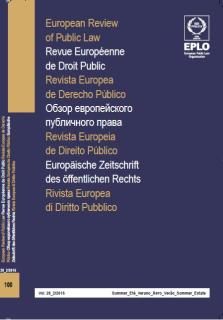
Constitutional Law / Droit constitutionnel
2015
RUSSIA / RUSSIE
NIKITA ARAPOV
PhD, Assistant Professor of Constitutional and Administrative Law, Law Faculty of St. Petersburg State University
EKATERINA DMITRIKOVA
PhD, Associate Professor of Constitutional and Administrative Law,
Law Faculty of St. Petersburg State University
ALEKSEI DOLZHIKOV
PhD, Associate Professor of Constitutional and Administrative Law,
Law Faculty of St. Petersburg State University
ALEXANDER ZEZEKALO
PhD, Associate Professor of Civil Law, Law Faculty of St. Petersburg State University
The chronicle reviews the development of Russian constitutional law in 2015. The amendments to Russian constitutional law cover most of its basic institutions such as constitutional review, legislature, administration, elections, constitutional rights and the system of their protection, local self-government etc. Some of the amendments are substantial; others are ordinary. Nevertheless, the most significant amendment of the constitutional law is undoubtedly the extension of the Russian Constitutional Court's competence concerning its authority to rule on whether the decision of an international jurisdictional body on human rights protection complies with the Russian constitutional legal order and shall therefore be executed. Although this is the most important event of the Russian constitutional development, there are others - including the State Duma elections and local self-government development - which are discussed in this chronicle.
La chronique passe en revue l'évolution du droit constitutionnel russe en 2015. Les modifications apportées au droit constitutionnel russe couvrent la plupart de ses institutions fondamentales, telles que le contrôle constitutionnel, la législature, l'administration, les élections, les droits constitutionnels et le système de leur protection, l'autogouvernement local, etc. Certaines de ces modifications sont substantielles, d'autres sont moins significatives. Cependant, la modification la plus importante du droit constitutionnel est sans aucun doute l'extension de la compétence de la Cour constitutionnelle russe, qui peut décider si l'arrêt d'un organe juridictionnel international sur la protection des droits de l'homme est conforme à l'ordre juridique constitutionnel russe et doit donc être exécuté. Bien que cela soit le fait le plus important de l'évolution constitutionnelle russe, il y en a d'autres, y compris les élections à la Douma et le développement de l'autogouvernement local, qui sont discutés dans la chronique.





















